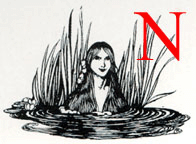 ature in literature creates two different results. Authors and poets use nature to enhance a mood or to portray an emotion, but nature can also contrast with a character's predicament or with the social surroundings. The second part of Tennyson's In Memoriam, uses both of these effects. The speaker finds elements in nature that both sympathise with his feelings and reject them. Thus, the poem seems hopeful, and there is the possibility that the speaker will be able to move on and cope with his loss.
ature in literature creates two different results. Authors and poets use nature to enhance a mood or to portray an emotion, but nature can also contrast with a character's predicament or with the social surroundings. The second part of Tennyson's In Memoriam, uses both of these effects. The speaker finds elements in nature that both sympathise with his feelings and reject them. Thus, the poem seems hopeful, and there is the possibility that the speaker will be able to move on and cope with his loss.
Old Yew, which graspest at the stones
That name the under-lying dead,
Thy fibres net the dreamless head,
Thy roots are wrapt about the bones.
The seasons bring the flower again,
And bring the firstling to the flock;
&; in the dusk of thee, the clock
Beats out the little lives of men.
O, not for thee the glow, the bloom,
Who changest not in any gale,
Nor branding summer suns avail
To touch thy thousand years of gloom:
And gazing on thee, sullen tree,
Sick for thy stubborn hardihood,
I seem to fail from out my blood
And grow incorporate into thee.
The speaker recognises his own predicament in the old yew tree. He's tied himself to the dead in the same way in which the yew has wrapped its roots around the bones. Outside happiness doesn't touch him and he doesn't change with his changing surroundings, like the evergreen yew. The yew, however, is only a part of nature. The poem also mentions the coming of spring, complete with flowers and new lambs. If the scene described in the poem had been completely dark and dreary, then one might think that the speaker would be doomed to perpetual mourning. As it is, spring may come again.
Questions
1. Could "Yew" be a play on words, meaning "you"? If so, how does this change or add to the meaning of the poem?
2. Nature often conflicts with events and the feelings of the title character in Jane Eyre. For example, when Mr. Rochester proposes, there is a storm, and when Jane runs away from Mr. Rochester and is starving and penniless, it is a beautiful day. How does Brontë's use of nature differ from that of Tennyson? Or does it?
3. Possibly more important to the speaker than the question of nature in relation to feeling or mood is the question of Nature vs. God. What does this poem say about the latter relationship?
4. Look at the last two lines: “I seem to fail from out my blood/and grow incorporate into thee". What do they mean? What does the speaker mean by "fail from out my blood"?
5. The speaker mentions "the little lives of men", which makes it seem like he feels small in the world. He then, however, connects himself with a powerful, thousand-year old tree. What does this say about man's place in the world? Why would the speaker use these two conflicting ideas?
Related Material
Last modified 3 February 2009